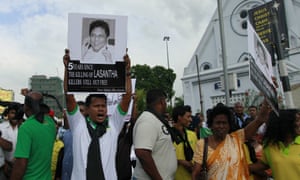Gotabaya Rajapaksa was defence secretary in last years of war against Tamil Tigers
by Michael Safi, The Guardian, UK, April 9, 2019

Protesters call for justice for Lasantha Wickrematunge in 2014. Photograph: Eranga Jayawardena/AP
The brother of the former Sri Lankan president Mahinda Rajapaksa is being sued in a US court over alleged extrajudicial killing and torture, by the same lawyers who successfully brought a civil suit against the Syrian government for the killing of the Sunday Times journalist Marie Colvin.
Gotabaya Rajapaksa was Sri Lanka’s defence secretary during the final years of the country’s civil war against the Tamil Tigers until his brother lost the presidency in 2015, and has been mooted as the family’s presidential candidate in this year’s election.
He is believed to have directly overseen the country’s police and military, which have been accused by the UN, human rights groups and Sri Lanka’s own investigative agencies of crimes including torture, arbitrary detention and extrajudicial killings both during the Tamil conflict and in the years since it ended in 2009.
Private investigators working on behalf of the legal teams tracked Rajapaksa down on Sunday night to a Trader Joe’s car park in the Californian city of Pasadena, where he was formally served with notice of the civil suits.
One relates to Roy Samathanam, a Canadian citizen of Tamil origin who a UN human rights committee has concluded was detained by Sri Lankan counter-terrorism police and tortured for three years on baseless accusations of aiding the Tigers.
The alleged torture included beatings, painful handcuffing and being forced to witness rapes by security forces. “Sexual assaults were normal on women inside the prison,” Samathanam told a press conference in London on Tuesday.
“The images I saw, the girls who were there and the guys were being sexually assaulted, I can still remember their faces and I can still remember what happened.”
A second suit alleges Gotabaya “instigated and authorised” the extrajudicial killing of Lasantha Wickrematunge, a veteran journalist who prophesied his own death in an editorial that ran a few days after he was gunned down while driving to work in 2009.
Gotabaya, 69, was a US citizen at the time of the alleged offences, but would have to give up his American citizenship if he ran for president later this year. “So this was probably the last chance for a long time to begin to hold him accountable,” said Yasmin Sooka, the executive director of the International Truth and Justice Project, the group bringing the torture suit.
The killing suit was brought by the Centre for Justice and Accountability on behalf of Ahimsa Wickrematunge, Lasantha’s daughter-in-law. The complaint is sealed but lawyers have applied to make it public.
Gotabaya has been contacted for comment. Should he defend the case and lose, or choose not to contest it, he could be ordered to pay compensation that might be extracted from any assets he owns in the US.
The torture suit is being led by Scott Gilmore, who in January won a civil caseagainst the Syrian government for the extrajudicial killing of Colvin, a Sunday Times war correspondent. The court ordered Syria to pay $300m (£228m) in punitive damages.
Lawyers will seek to argue that Gotabaya had “overall command and control” of the forces that tortured Samathanam, and is therefore legally liable for their conduct.
“Gotabaya made it very clear in his public statements that for many years he centralised control of the security forces,” Gilmore said.
“These incidents were widely reported, documented by the UN, and the Sri Lankan government was repeatedly confronted with these allegations. So as defence secretary he clearly knew that these abuses were taking place, or allegedly taking place, but he never took the legal steps to investigate or punish the perpetrators.”
Sri Lanka pledged in 2015 to investigate and prosecute human rights abuses during and after the civil war, but that process has stalled in domestic courts and the country has resisted turning over its citizens to hybrid or international justice processes.
The country’s progress towards human rights reform has “virtually ground to a halt” and brutal torture is used with impunity, the UN concluded in a scathing report last year.